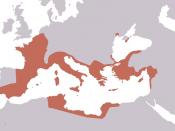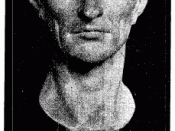It is generally accepted that hardship would ensue harsher test of one's character than power would. Abraham Lincoln attempted to denounce this belief when he claimed that "Nearly all men can stand adversity, but if you want to test a man's character, give him power." Lincoln illustrates that adversity is something that many men can succeed in spite of while maintaining their character by comparing its effects with those of power. He sustains the idea that a man's character is only truly tested if they are given power because of its corrupting influence. Lincoln's ideas are substantiated in the play Julius Caesar, in which William Shakespeare explores topics of adversity and power. Through his characterization of Julius Caesar, Mark Antony, and Brutus, Shakespeare clearly indicates that the true test of a man's character is, in fact, power rather than adversity.
Julius Caesar is able to easily overcome misfortune; however his character is challenged by the corrupting influence of power.
Though Calpurnia is unable to conceive a child, denying Caesar an heir, Caesar can withstand this hardship and continues in his quest for power. Later, when the soothsayer cautions him concerning the 15th of March, Caesar dismisses the caveat as frivolous. In reply to his warning to "beware the ides of March," Caesar calls the soothsayer a "dreamer," and decides that they should all "leave him; pass" (I. ii. 28-29). Julius Caesar replies in this way because he feels he would be able to overcome any adversity that could impede his success. Through this situation, Shakespeare proves that Caesar, like most men, is able to easily endure adversity. When Caesar gains power, however, he is disillusioned by it. As Cassius attempts to persuade Brutus to join the conspirators, he demonstrates how Caesar is actually a cowardly man who has a...


